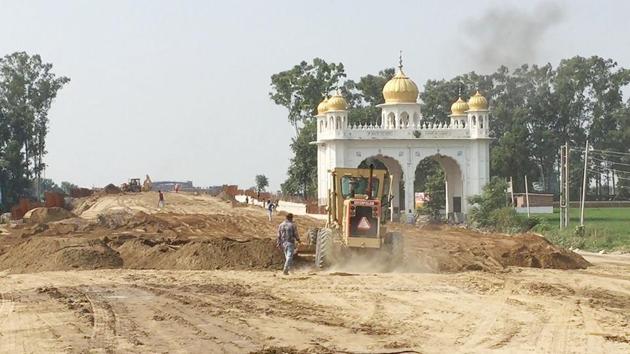Kartarpur Corridor puts Dera Baba Nanak on road to progress
India and Pakistan on Thursday signed an agreement for operationalising the Kartarpur Corridor that will allow Indian pilgrims visa-free access to the gurdwara built at the site in Pakistani Punjab where Guru Nanak, the founder of Sikhism, spent the last years of his life.
The Kartarpur Corridor, which will open next month, has catapulted the otherwise sleepy town of Dera Baba Nanak as a port of trans-border pilgrimage, giving a fillip to the local economy and raising hopes of brighter days for the border belt in Punjab.

India and Pakistan on Thursday signed an agreement for operationalising the Kartarpur Corridor that will allow Indian pilgrims visa-free access to the gurdwara built at the site in Pakistani Punjab where Guru Nanak, the founder of Sikhism, spent the last years of his life.
The agreement provides a formal framework for the corridor that will link Dera Baba Nanak, 65 km from Amritsar, in India’s Gurdaspur district to Durbar Sahib Gurdwara in Pakistan’s Kartarpur.
Local residents and entrepreneurs, particularly in the hospitality and travel sectors, say the economic spinoff from the work on the Kartarpur Corridor as a godsend. However, they also point put that there is a hitch given the volatility in the ties between India and Pakistan.
The corridor may have opened up opportunities and led to the tripling of real estate prices but the enthusiasm is yet to translate into land deals in the town that has remained in the shadow of neglect after being the theatre of two wars between India and Pakistan in 1965 and 1971.
The uncertainty in relations with the neighbouring country is to blame.
Only queries, no deal
Local farmers and officials say although prospective buyers have been inquiring about land prices but nothing has materialised.
“People wanting to buy land along the highway have contacted me since I’m in the revenue office. They check the price and seek advice but not a single case of sale of land has come to me so far,” says Kuldeep Singh, the tehsildar of Dera Baba Nanak.
Suba Singh, a farmer who owns 70 acres along the highway near Chandu Nangal village on the town’s outskirts, also says prospective investors come visiting every two days.
“Some parties are even from Delhi and Mumbai. Most want to open hotels but nothing has been finalised. Both buyer and seller are reluctant. For instance, a landlord sought Rs 80 lakh per acre from a party but a few days later, another party offered him Rs 1.2 crore an acre. The price of the land has not been fixed yet,” Suba Singh says.
He says there are fears that a wall may be built along the highway which would negate the purpose of building hotels there.
“It’s wait and watch. We are waiting to assess the response. We’ll know how much time pilgrims spend in town and if retail traders will benefit. The time for entering and exiting Pakistan through the corridor will be fixed so we don’t know if they stay here or leave. It will take a few months to understand things,” says Sukhdeep Singh Bedi, a descendant of Guru Nanak Dev and social worker.
Traders need stability
People think the atmosphere is cordial for opening the corridor on the occasion of the 550th Parkash Parb or the birth anniversary of Guru Nanak Dev, says Perneet Singh Bedi, the president of the local municipal council.
“But things may get worse due to tension between the two countries. In such a situation, where do we go after investing crores?” Perneet Singh Bedi asks.
Amritsar-based hotelier Surinder Singh has similar concerns.
“We are interested but there are doubts. Instances of the Samjhauta Express, Delhi-Lahore bus service and Indo-Pak trade being suspended after the tension in Kashmir are concerns. Will the corridor also be affected? Investors are in double mind,” Surinder Singh says.
“A Delhi company wants to set up a tent city for pilgrims but investors are hesitant. They fear the money may go in vain given the situation,” he adds.
Guru Nanak’s descendent Sukhdeep Singh points out that nobody knows how much land is to be acquired at this stage.
“A lot needs to be done as part of the corridor project. For instance, the land will have to be acquired for residential flats for employees of departments such as customs, Border Security Force, army, intelligence agencies and immigration bureau. The land acquisition for these tasks is pending,” he says.
“Secondly, this town has hardly got 10 such people who have enough to spend on commercial outlets or hotels. Of them, some are not interested or are not cut out for entrepreneurship. Unless an investor comes from outside, the town’s growth is not possible,” he adds.
Cities to benefit
The hoteliers in Amritsar, Batala or Gurdaspur are likely to benefit as the sangats (pilgrims) visiting Kartarpur are less likely to stay in Dera Baba Nanak due to the online system of seeking permission.
These cities are 55 km, 35 km and 20km away respectively from Dera Baba Nanak.
“The government has closed both sides of the highway to pave the way for the corridor. So nobody can go on or get off the highway from its sides. The investors have no option other than selecting a site at the point from where the highway starts and roads from Amritsar, Gurdaspur and Batala meet,” says Perneet Singh Bedi.
The says the municipal council president urged the government to open a manual permission application counter at Dera Baba Nanak.
Ashok Manan, who owns a transport firm that runs buses from Amritsar to Dera Baba Nanak, says he is willing to increase the number of buses on the route but it is up to the state government to allot permits.






